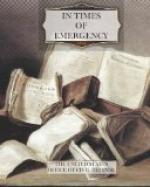INTRODUCTION
A major emergency affecting a large number of people may occur anytime and anywhere.
It may be a peacetime disaster such as a flood, tornado, fire, hurricane, blizzard or earthquake. It could be an enemy nuclear attack on the United States.
In any type of general disaster, lives can be saved if people are prepared for the emergency, and know what actions to take when it occurs.
With the aid of Federal and State governments, cities and counties in all parts of the country are developing their local civil defense systems—the fallout shelters, supporting equipment and emergency plans needed to reduce the loss of life from an enemy attack.
While these local government systems have been set up mainly as safeguards against nuclear attack, they have saved lives and relieved suffering in many major peacetime disasters. People have been warned of impending storms and similar dangers, told how to protect themselves, sheltered from the elements, fed and clothed, treated for injury and illness, and given help in resuming their normal lives. Experience has shown that as cities, counties and towns develop their systems to preserve life under nuclear attack conditions, they also become better prepared to deal effectively with peacetime disasters.
In cooperation with the U.S. Office of Civil Defense and the States, many local governments are improving their civil defense systems by preparing community shelter plans. These plans include instructions to local citizens on what to do in the event of nuclear attack.
This handbook, “In Time of Emergency,” contains basic general information on both nuclear attack and major natural disasters. This general guidance supplements the specific instructions issued by local governments. Since special conditions may exist in some communities, the local instructions may be slightly different from this general guidance. In those cases, the local instructions should be followed.
Part I (pages 3-68) is concerned with nuclear attack and basic actions to take.
Part II (pages 69-86) discusses preparations and emergency actions that will help individuals cope with major natural disasters—floods, hurricanes, tornadoes, winter storms, and earthquakes.
In addition to following the advice given in this handbook and the instructions of their local governments, people can prepare themselves better to meet any major disaster by taking training courses to develop their “emergency skills.” Especially recommended are these courses:
“Personal and family survival” (12-hour course)—A basic orientation course in civil defense, which also tells people how to improve their protection against the effects of a nuclear attack.
“Medical Self-help” (16-hour course)—How to care for the sick and injured if a doctor or nurse is not available.




